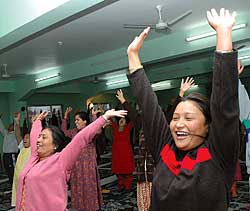 Yoga has always been a popular form of exercise for those wanting to stay in shape but its ability to calm the mind and filter thought processes is what beats a workout at the gym any day.
Yoga has always been a popular form of exercise for those wanting to stay in shape but its ability to calm the mind and filter thought processes is what beats a workout at the gym any day. Endless bandas, staunch smell of burnt rubber after riots, road blockades when least expected and bumper-to-bumper traffic jams are all in a day's work in Kathmandu. So the denizens of the capital don't just need to limber up their limbs but also relieve stress.
"Yoga teaches you to be masters of the mind so it doesn't master you," says Sangeetha Raghavan, a scholar of yogic studies and spiritual philosophy. "It lets your conscious state, the most superior, escape all involvement with your material surroundings."
Life goes on but the imperceptible anxiety caused by the sight of guns, security checks and traffic, all add up. Cumulatively, it can affect a person's physical health, unless you decide to do something about it and take up yoga. It works. After all, in the last decade, hundreds have turned to yoga as a way of strengthening their inner selves, cleansing their conscious state of all worries and giving thoughts a healthier direction.
The principles of yoga are deep-rooted. Based on scriptures of Hindu philosophy, they remain exactly the same thousands of years later. Krishna says: "The mind is restless and hard to control. But it can be trained by constant practice (abhyasa) and by freedom from desire (vairagya)." This dialogue between Arjun and Krishna in the battlefield of Kurukshetra is remarkably relevant in exploring why yoga has become the most popular forms of mental therapy, especially in countries caught in political crises.
"I treat many young patients nowadays and most require a combination of breathing exercises and meditation to relieve stress," says Laxmikanth Pandey of the Yoga and Nature Cure Research Centre in Lajimpat. Contrary to the idea of modernising yoga to make it fashionable, this age-old form of relaxing and controlling the human mind and body has come to its own in Kathmandu. For a vigorous calorie-killing workout, most fitness freaks would prefer two hours of pumping weights but many are now trooping to yoga centres that are mushrooming in every galli in town.
"Just like running a marathon causes exhaustion, a strained thought process can cause mental fatigue. The only way to relax is to reach a level of concentration that allows your inner self to transcend reality and set your mind free," says Satyam Singh, a part-time yoga instructor offering classes in the basement of his home in New Baneswor. Other yoga centres in the area, including the Satyananda Yoga Centre, the Divine Yoga Institute and the Royal College of Lifestyle Medicine and Hospital, are all doing brisk business.
 Some take yoga classes and meditate in their own bedrooms by switching on the tv and flipping to the Astha Channel. "It has become very popular in Kathmandu," says Rita Thapa, who used to work for the World Health Organisation. "I met a friend who is usually depressed but seemed very happy for a change and the first reason I thought of was he'd been watching a lot of Astha."
Some take yoga classes and meditate in their own bedrooms by switching on the tv and flipping to the Astha Channel. "It has become very popular in Kathmandu," says Rita Thapa, who used to work for the World Health Organisation. "I met a friend who is usually depressed but seemed very happy for a change and the first reason I thought of was he'd been watching a lot of Astha." Some of the 80 overseas Indians trapped in the World Trade Centre as it was engulfed in overpowering heat on 11 September 2001 turned to yoga as their last resort. So there must be something to the philosophy that binds yoga: 'there is no power greater than that of the mind'.
Yoga has even tamed the hearts of hundreds of prisoners in Kathmandu. Inspired by the miracles Kiran Bedi spun after teaching meditation techniques and breathing exercises to some of India's most hardcore criminals in New Delhi's Tihar Jail, Acharya Shree Dhruv began the same in Nepal in 1997 to cleanse their minds and souls.
"I teach them how to reach a state of self-satisfaction through various meditative exercises making them believe that all wrong-doings stem from an illusion of a thwarted state of mind," says Dhruv who has taught yoga at prisons in Biratnagar, Birganj, Dhulikhel, Sindhupalchok and the Central Jail. "We've healed prisoners of stomach and digestive disorders through regular practice of yoga techniques. Some criminals were even suicidal but we brought them from that stage safely."
Yoga has become a haven for peace-lovers and troublemakers alike. Perhaps one answer to a healthier, happier and peaceful society would be to make yoga mandatory to all those who have taken the path of violence.


